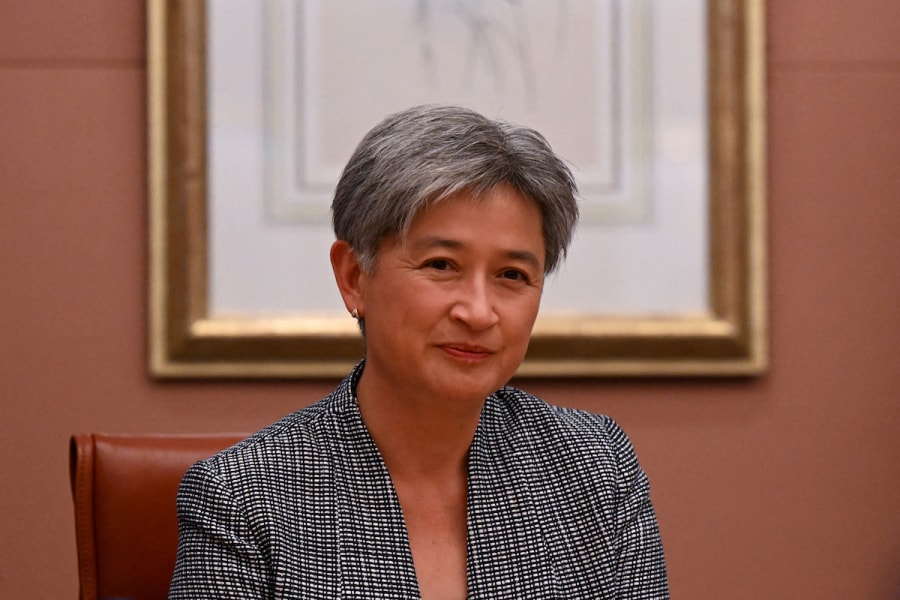Israel fears Australia may recognize Palestinian statehood
On Monday, the Australian Department of Foreign Affairs removed text about the recognition of “West Jerusalem” from its website

After Australia retracted its recognition of “West Jerusalem” as Israel’s capital on Tuesday, the Israeli government expressed concern that the Labor Party government in Australia might be planning to recognize a Palestinian state.
The foreign minister of the center-left Australian government said it was correcting the previous, Conservative government’s 2018 recognition of West Jerusalem as Israel’s capital, saying it had been “a cynical play” to win a by-election seat.
Australia’s 2018 announcement under then-Prime Minister Scott Morrison followed the move of the U.S. embassy from Tel Aviv to Jerusalem. At the time, the Israeli government said that Australia had not gone far enough, as it had not recognized an undivided Jewish capital and was not moving its embassy from Tel Aviv to Jerusalem.
The statement by Foreign Affairs Minister Penny Wong served as a reply to an article in The Guardian, which reported Monday that the Australian Department of Foreign Affairs removed text about the recognition of “West Jerusalem” from its website. The deleted text described “West Jerusalem as the capital of Israel” and stated that Australia “looks forward to moving its embassy to West Jerusalem when practical, in support of, and after the final status determination of, a two-state solution.”
The Guardian reported that the edit to the website text followed an inquiry to the department about the government’s view on the status of Jerusalem.
The current center-left Labor party government supports the creation of two states in the Holy Land, and the foreign affairs minister argued that the previous move in the direction of recognizing even part of Jerusalem for Israel was “all risk and no gain,” putting Australia “out of step” with the international community. Wong said Jerusalem’s status should be decided through peace talks between Israelis and Palestinians, and not through unilateral decisions.
Israeli Prime Minister Yair Lapid called Wong’s walk-back of Jerusalem’s partial recognition “a hasty response to incorrect news in the media.”
“We can only hope that the Australian government manages other matters more seriously and professionally,” Lapid said. “Jerusalem is the eternal capital of united Israel and nothing will ever change that.”
Lapid also heads the foreign ministry in Israel, which expressed “its deep disappointment” over the decision, calling it the result of “shortsighted political considerations.” The ministry said the Israeli government was weighing additional steps to take in response.
Australia announced its shift on Jerusalem without giving any notification to the Israeli government or even to Australia’s ambassador in Tel Aviv.
Wong first denied any change in official policy, but later said that the decision to recognize Jerusalem as Israel’s capital had “caused conflict and distress in part of the Australian community, and today the government seeks to resolve that.”
She also described the decision by the Conservative Morrison government as an attempt to gain Jewish votes in a crucial election.
“You know what this was? This was a cynical play, unsuccessful, to win the seat of Wentworth and a by-election,” she said.
Wong insisted that the announced policy was not intended to suggest any hostility toward Israel, and said that Australia will always be a steadfast supporter of Israel as well as “equally unwavering in our support of the Palestinian people, including humanitarian support.”
The State of Israel asserts that its undivided and eternal capital is Jerusalem – a city at the core of Jewish longing and the key place of return from exile for the people of Israel for millennia. “Jerusalem” or “Zion,” which Moses called “the place where the Lord your God chooses to establish His name.” It appears 823 times in Old Testament writings.
Israel’s “weeping prophet,” Jeremiah, who lived ca. 650-570 B.C., is attributed with writing the famous verses of Psalm 137: “If I forget you, O Jerusalem, may my right hand cease to function. May my tongue cling to the roof of my mouth if I do not remember you, if I do not exalt Jerusalem as my greatest joy!”
After Jordan occupied the eastern portion of Jerusalem, as well as Judea and Samaria, following Israel’s War of Independence in 1948, the Hashemite Kingdom annexed what it called “the West Bank” in 1950; it ruled parts of Jerusalem, including the Old City for the next 17 years.
In the Six-Day War in 1967, Jordan lost all the territory it had gained in the earlier war and Israel gained control over Jerusalem and the West Bank. Israel’s claim to its ancient capital, however, has not been recognized by most nations.

The All Israel News Staff is a team of journalists in Israel.














